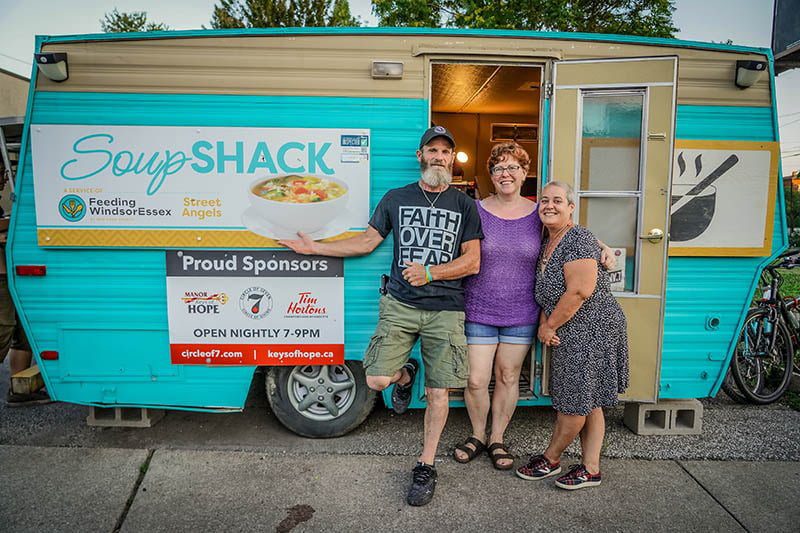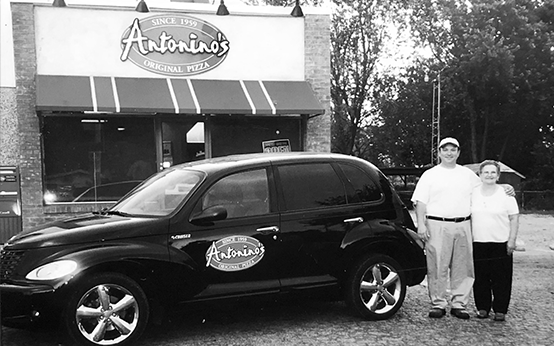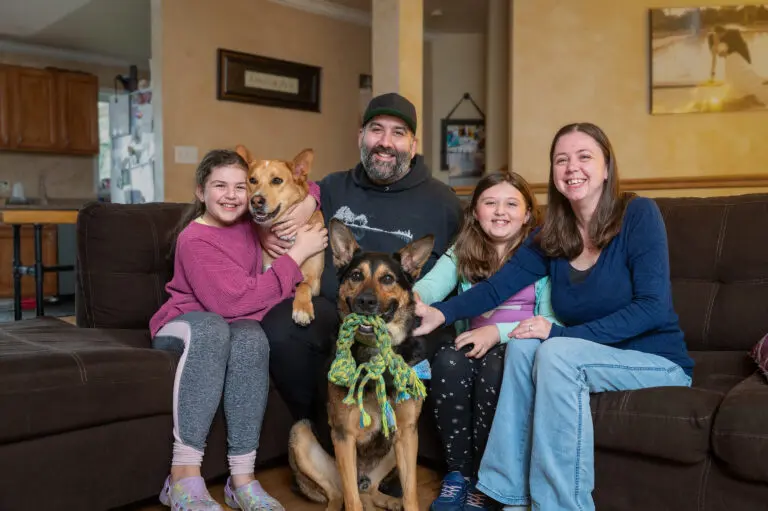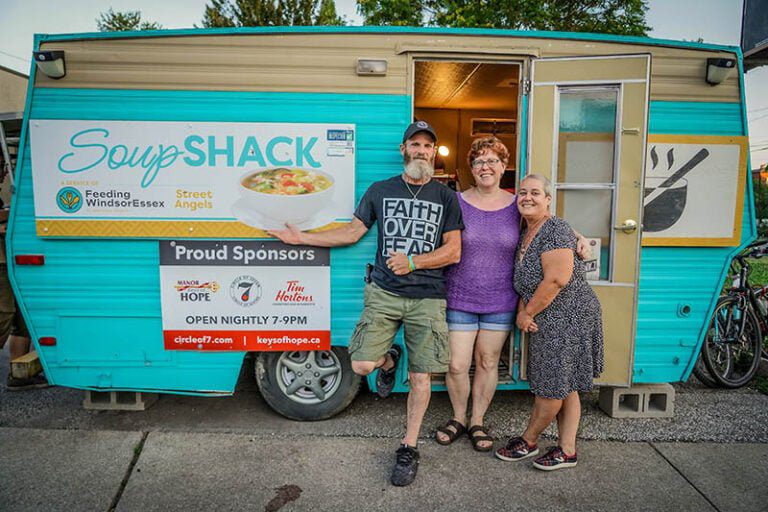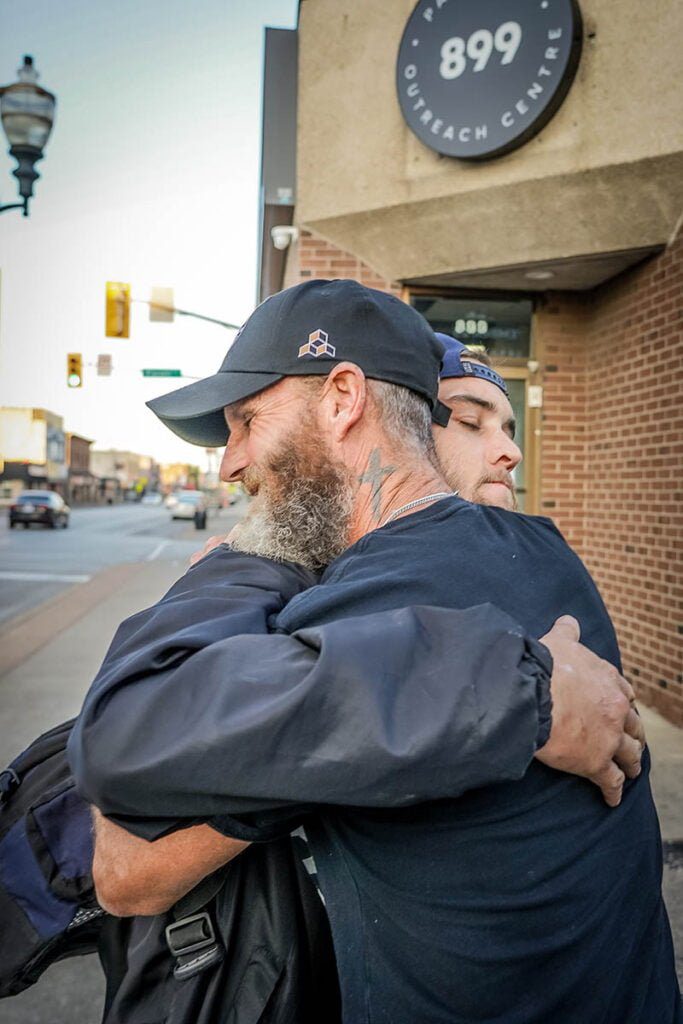
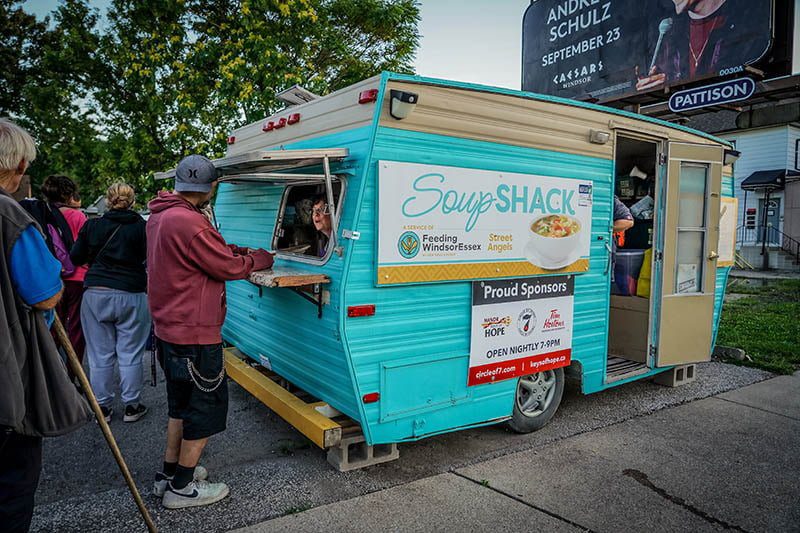
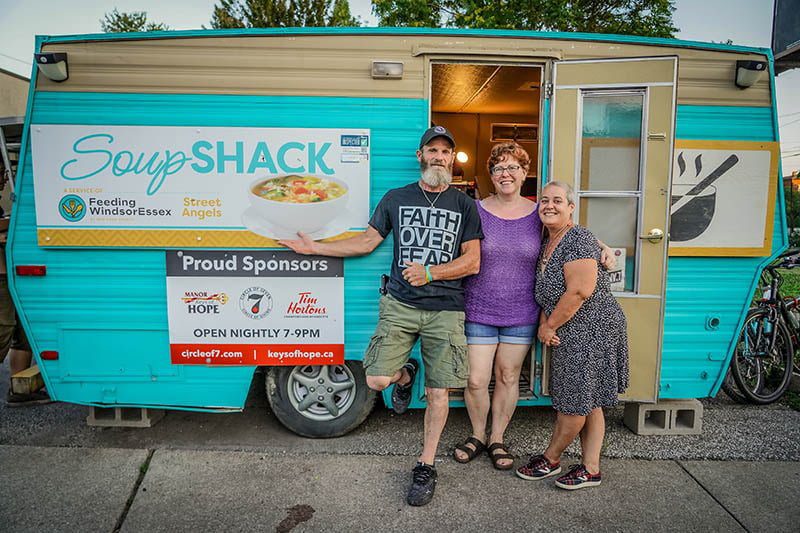
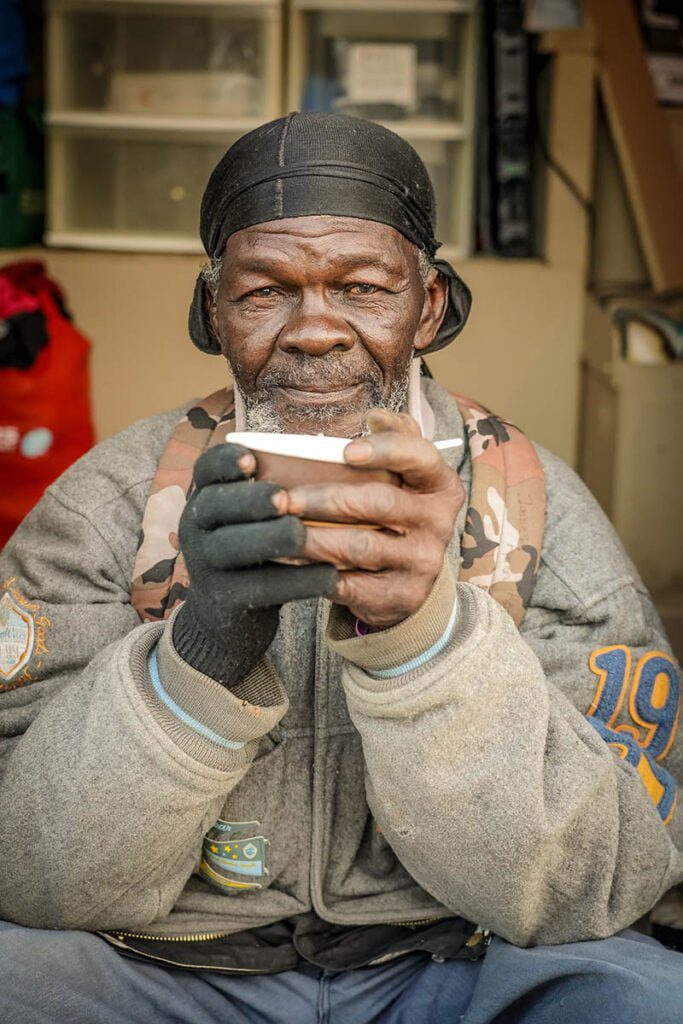
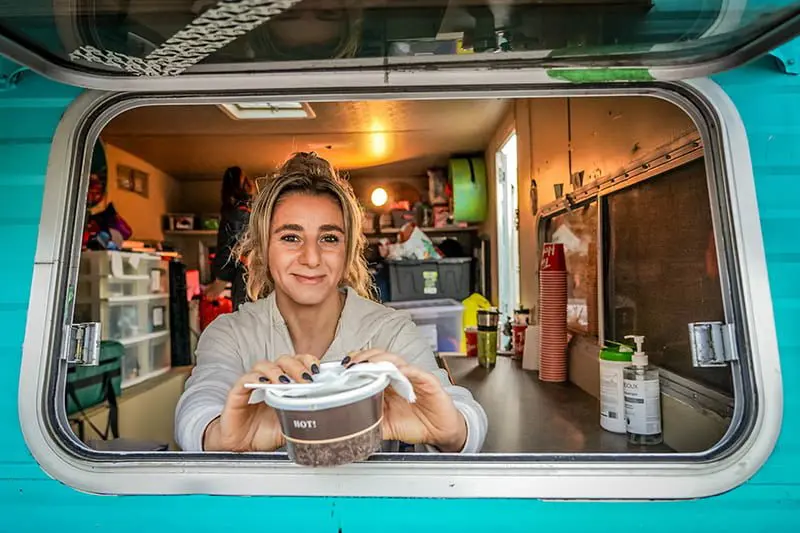
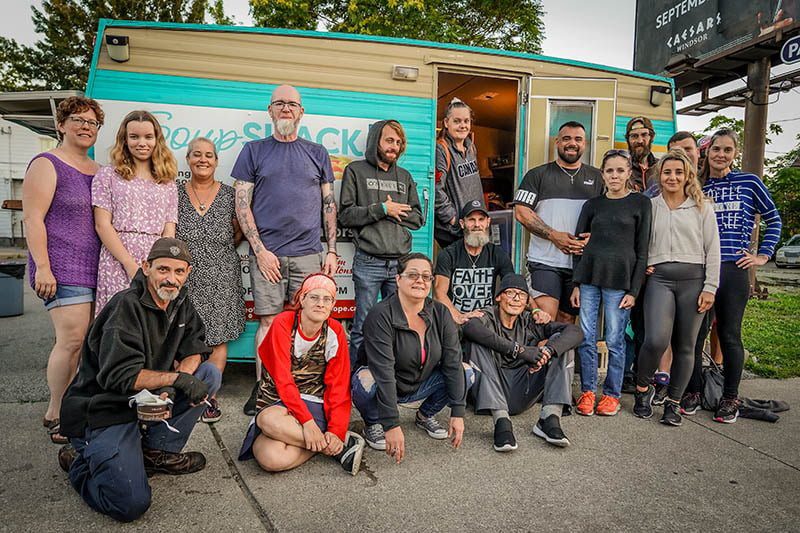
In a world sorely lacking in miracles, one can be found on the corner of Wyandotte Street and Parent Avenue in the parking lot of Parkwood Gospel Church. It opens and closes like clockwork, seven to ten p.m. Everyone is welcome. This miracle is a reconverted camper called The Soup Shack.
It probably doesn’t look like much to anyone passing by on Wyandotte Street, but The Soup Shack is a safe zone for people living on the margins of society. The reasons for their plight are as varied as the citizens themselves: mental illness, substance abuse, bad luck. Each evening, they line up at The Soup Shack’s window. The food they receive, in many cases, is their only meal of the day: soup, bread, granola bars, hot chocolate, apples, depending on donations.
The Soup Shack started in October 2021 as a pilot project created by Merissa Mills of Street Angels, in collaboration with Feeding Windsor Essex. It is tended by a small band of faithful led by Bobby Reaume, one of its original volunteers. Asked about his title—administrator, facilitator, manager—Bobby shrugs and says: “I’m just Bobby.”
At age 50, Bobby has lived several lifetimes and has even risen from the dead.
He spent the first years of his life in Windsor before moving with his family to Alberta and then to Hamilton, a few years later.
“I smoked my first joint when I was nine,” Bobby says. “A friend’s older brother said: ‘You wanna try this?’ I said: ‘Sure.’ I was a shy kid and didn’t have many friends because of moving to different provinces, going to different schools.”
He continues: “My friends and I were the street kids: sneaking beers, cigarettes, and weed. Then there was a break when I played hockey. I still felt alone, though, because the hockey guys were their own clique. After I left hockey, things spiraled. With drugs, the shy kid became the social butterfly. I had all of these friends—they weren’t the greatest, we got into a lot of trouble. Mom and dad were always at work. I could play outside as long as I wanted.”
Bobby tried cocaine for the first time at age 13. By then, he and his family lived in Hamilton. He started selling cocaine the same year.
“I was arrested when I was fifteen for multiple car thefts,” Bobby remembers. “I was kicked out of the house and became a full-time drug dealer in Toronto, selling hash. I was happy where I was. I had grown men coming to me for ten-dollar chunks of hash. Walking down Yonge Street, I felt invincible. Then I’d get robbed, got beat up. I’d have to figure out ways to pay for the drugs that were stolen from me.”
Bobby lost many friends along the way. Dealing crystal meth and fentanyl, he says he felt like a god. “They were dying [his customers], I’d bring them back, and sell them dope again. This is how sick it gets. I want to deter people from this. We’re seeing lots of younger kids smoking fentanyl. Ten years ago, it was lethal, but not as powerful as now. I overdosed on it four times. Then I became an IV drug user.”
Bobby speaks of the horrors of his experience in an understated tone. He has learned hard lessons through his life and there is a glint of each of them in his eyes. That said, Bobby is quick to smile, and he loves to hug people. He is a jovial, welcoming master-of-ceremonies at The Soup Shack, greeting friends he’s made over the past 10 months. He tells people he loves them and offers them socks and shirts on an as-needed basis. And when the reality of the streets encroaches at The Soup Shack, Bobby is also the security detail.
“This is a safe zone,” he says. “We don’t want any drug dealing here, nobody doing drugs, no picking up girls. But some people test this out. I’ve worked hard to make this a safe place, so people can chill and eat and then be on their way. We had one guy trying to pick up a girl. When I asked him to stop, he tried to stab me. Before I knew it, all our regulars stood up and chased the guy out of there. Anyone who confronts me, the guys step in the way. It’s a humbling experience. I’m so grateful. It’s pure God. I can’t do this.”
It took many years and several turns of fortune for Bobby to hit rock bottom. That came in the depths of the COVID-19 pandemic. While serving a three-and-a-half-year prison term for drug possession and auto theft, Bobby received an early release due to the pandemic. Consumed by daily life in prison, while coming off drugs at the same time, Bobby paid little attention to news of the outside world. When he was released, he stepped out into a post-apocalyptic hellscape.
“Can I go to the mission?” Bobby asked a prison official. “‘No,’ he was told. ‘Everything is shut down.’ There was nowhere to go. I asked to go to rehab, and they told me: ‘Everything is shut down.’ So, I went across the street to a tent city. Within ten minutes, I had a needle in my arm.”
Later, when Bobby walked out to Barton Street—normally a busy Hamilton thoroughfare—he found it empty.
“Everything was gone,” he recalls, “except five hundred people living in that tent city. People walking around naked, people on fentanyl, meth, urinating and defecating out in the open, scavenging. One day I went for a walk and found a building to lay beside. I hadn’t slept in a week. It started raining and I said: ‘OK God, if you get me out of here, I’ll never touch another needle again.’”
Those words started a years-long journey to recovery. This autumn, Bobby celebrates three years being clean.
“I see myself in everybody who comes to The Soup Shack,” he says.
Among the volunteers—one of the original three, who asked that her name not be used—is an eighty-year-old woman who greets everyone at The Soup Shack window like neighbours.
“What I want everyone to know about the people who come here,” she says, “is how polite and grateful they are. Sometimes I’ll give one person two buns, and they’ll say: ‘No, give the other one to someone else!’ They look out for each other.”
Ten months ago, The Soup Shack served about 20 meals per day. By the time of this writing, they serve 90 to 100 meals a day.
On August 13, Bobby’s 50th birthday, three hundred people came to The Soup Shack. During the celebration, he received the Vigor International Humanitarian Award that goes to “unsung heroes.”
Asked if he feels like a hero, Bobby shrugs and says: “I’m just Bobby.”
On a recent evening, apples were donated to The Soup Shack. The volunteer at the window said to one lady: “Don’t mind the dents in the apple. It’s a little bit damaged.”
“I am too!” joked the woman. It’s not rare to hear laughter at The Soup Shack, but it is a very, very welcome sound.
Volunteers and donations are always needed. To inquire about how to help, contact Bobby at [email protected]. Clothing, toiletries, and other donations can be dropped off at the donation center located at New Song Church – Lifeline Campus at1240 Pierre Avenue, Wednesdays 3 to 7 p.m. and Saturdays 12 noon to 4 p.m. Every little bit helps.
